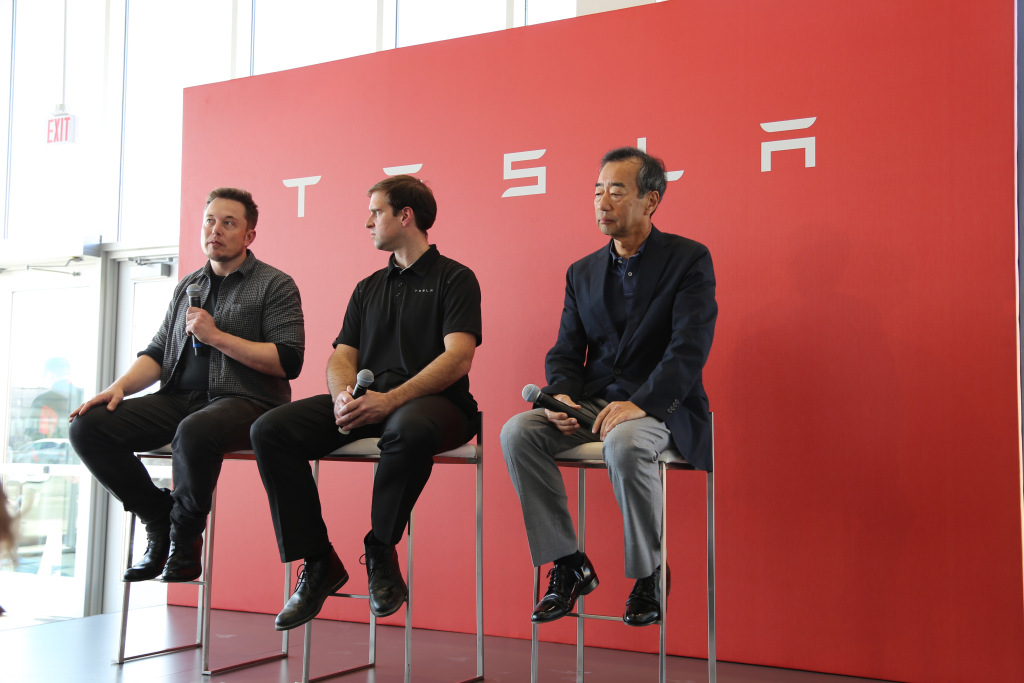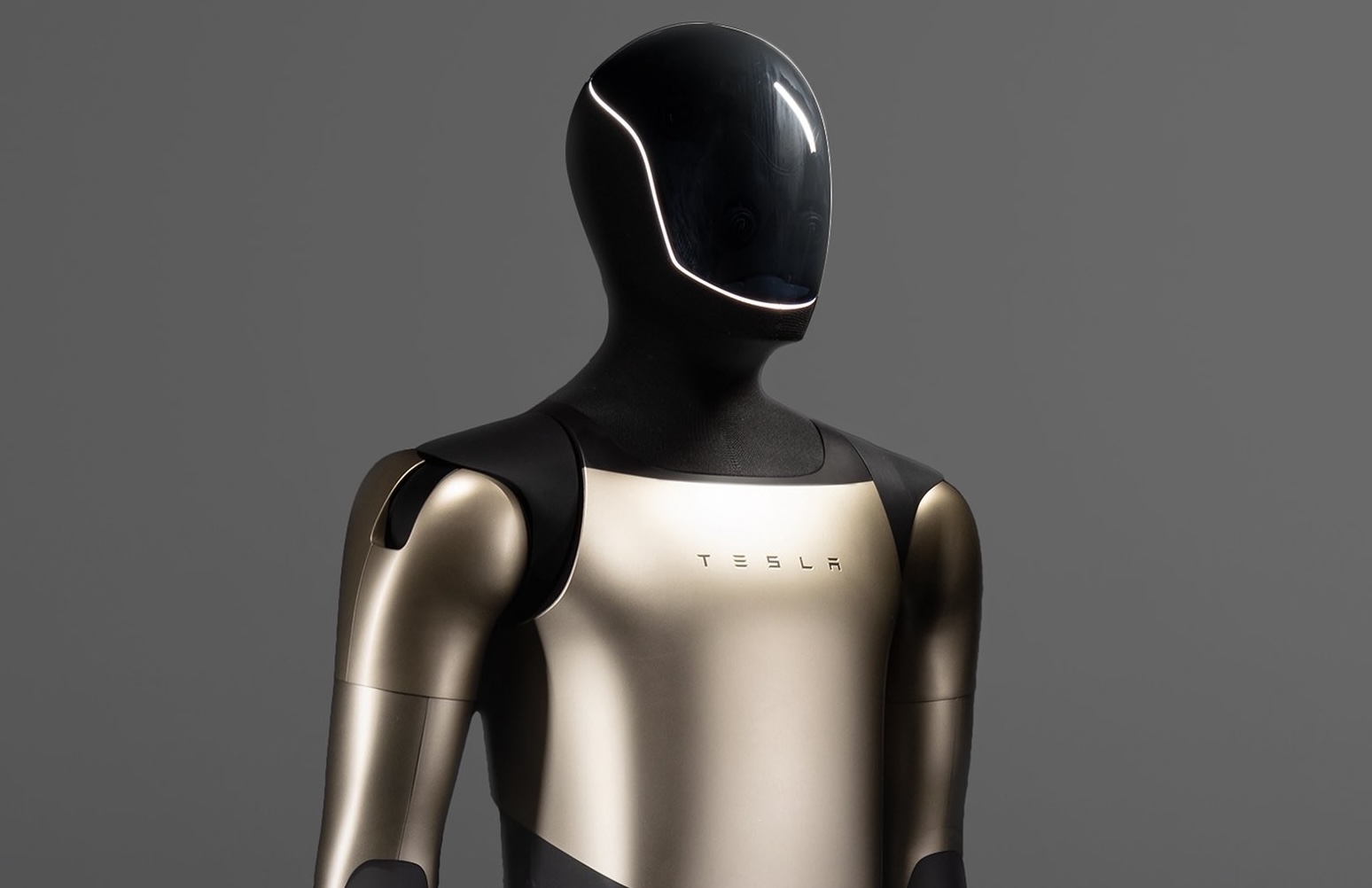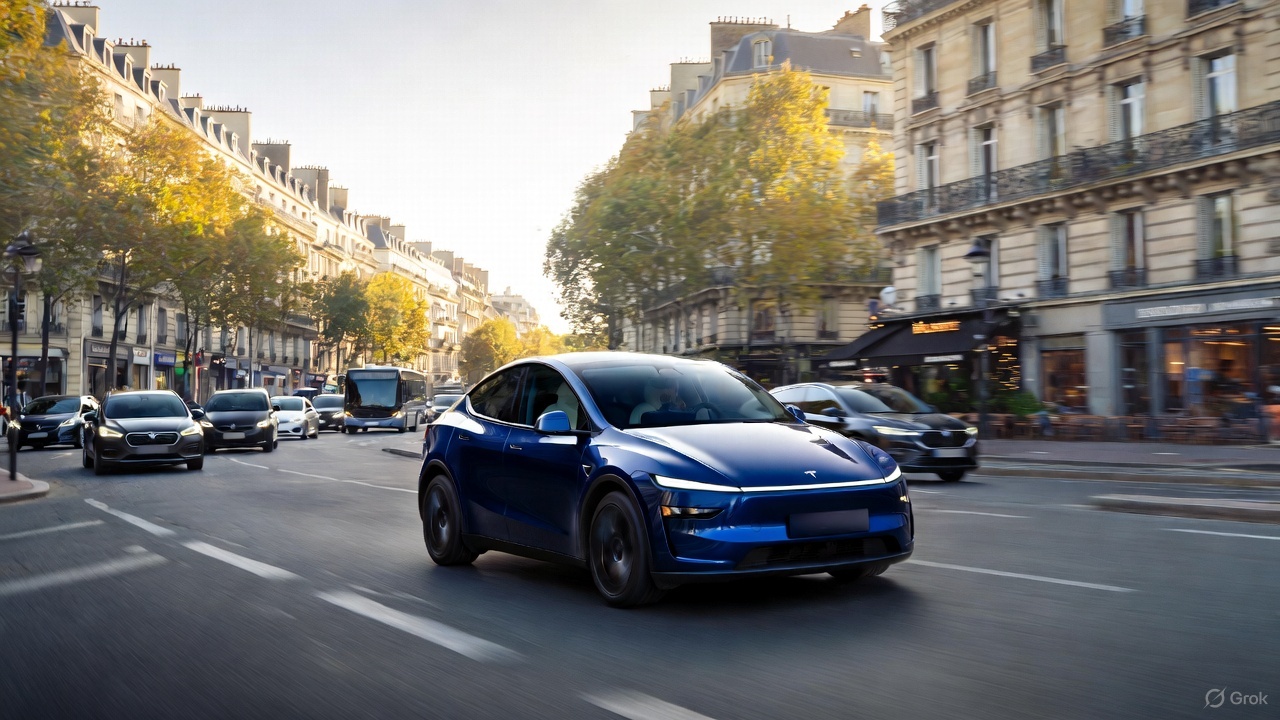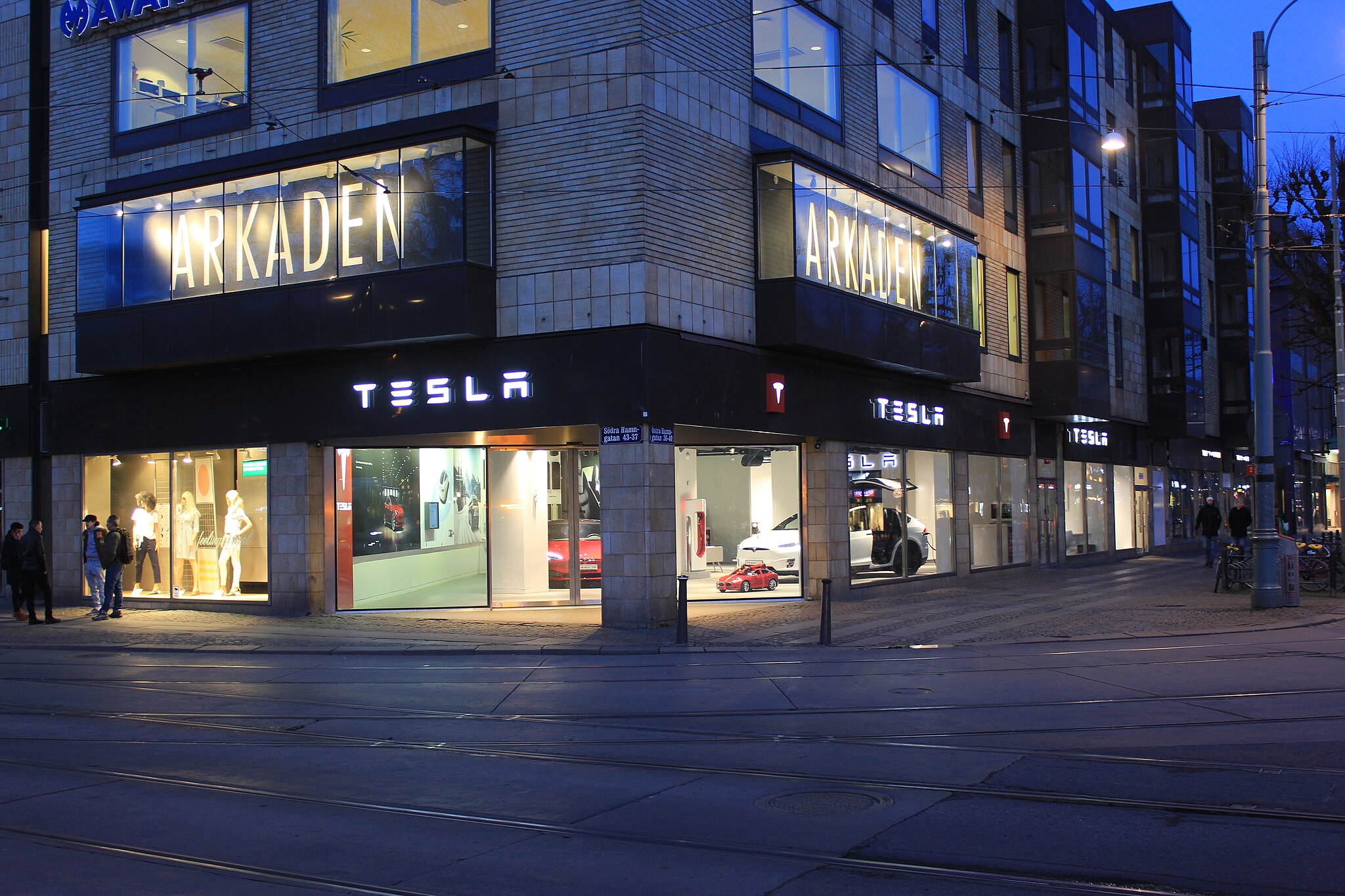News
Musk, Straubel, and Panasonic exec talk about the Gigafactory

The world is beating a path to the Tesla Gigafactory in advance of the grand opening celebration on Friday. Wednesday evening, Elon Musk, JB Straubel, and Panasonic executive vice president Yoshihiko Yamada took questions from the press in a wide ranging discussion that covered many topics. Here are some of the highlights.
On the Gigafactory
Musk: “The factory itself is considered to be a product. The factory is the machine that builds the machine. It actually deserves more attention from creative and problem solving engineers than the product it makes. What we’re seeing, if we take a creative engineer and apply them to designing the machine that makes the machine, they can make 5 times as much headway per hour, than if they work on the product itself.”
Then he added, “It may sound a little strange and sentimental but I find it to be quite romantic. The final shape will be a diamond, aligned on true north, I like that. It seems incredibly romantic. By the way there’s 10,000 wild horses in the area. They just hang out. We have construction ponds for water, so its quite cool to see the horses drink from the construction ponds.”
Yamada: “Three years ago I thought this gigantic Gigafactory idea was crazy. Because then the production of the factory would exceed production of the industry. I thought it was a crazy idea. But I was crazy, and I was wrong after seeing extreme success of the announcement of the Model 3 and the strong demand.”
The 2170 Battery Format
Straubel: “We’ve spent a lot of time on this actually. It’s kind of interesting. There are a bunch of trade offs. There are some things that get better when you make the cell size bigger, and some things that get worse. 18650 was sort of an accident of history. That was what was standardized for early products. So we revisited all of those trade offs and came to this size, which is quite a bit bigger. If you have them next to each other, the actual volume of materials inside is substantially more. And overall it’s about cost optimization.”
Musk: “It really comes from the first principles of physics and economics. That’s the way we try to analyze everything. To say like if no cell existed in the world, what size should it be? What is the size that would achieve the product characteristics we’re looking for, but would be fundamentally optimal? 18650 is not optimal.”
Paying For The Gigafactory
“One part of that is working with strategic partners like Panasonic. We are seeing very good participation from our supplier for the capital costs of the Model 3 ramp. So we are going to fund it by Model S and Model X revenue, with money we have right now, with potentially a modest capital raise, but not a significant one. In a nutshell, there may be a capital raise, but it’s not going to be a huge one.”
Panasonic’s Relationship With Tesla
Yamada: “I want to explain to you the relationship with Tesla and Panasonic. I used to be in charge of components five or six years ago. At that time our relationship with Tesla was one of supplier and customer. A conventional business relationship.
“But since we started discussion on the Gigafactory that’s completely changed. One example, is production capacity is now two or three times more. Why? Because Tesla and manufacturing people worked together. We are discussing these details. This type of relationship is quite new for business. We are not the simple buyer and supplier relationship.”
Musk had a great deal more to say about ramping up for production of the Model 3, solar power and energy storage. We will cover those topics separately.
Source and photo credit: Fortune

News
LG Energy Solution pursuing battery deal for Tesla Optimus, other humanoid robots: report
Optimus is expected to be one of Tesla’s most ambitious projects, with Elon Musk estimating that the humanoid robot could be the company’s most important product.

A recent report has suggested that LG Energy Solution is in discussions to supply batteries for Tesla’s Optimus humanoid robot.
Optimus is expected to be one of Tesla’s most ambitious projects, with Elon Musk estimating that the humanoid robot could be the company’s most important product.
Humanoid robot battery deals
LG Energy Solution shares jumped more than 11% on the 28th after a report from the Korea Economic Daily claimed that the company is pursuing battery supply and joint development agreements with several humanoid robot makers. These reportedly include Tesla, which is developing Optimus, as well as multiple Chinese robotics companies.
China is already home to several leading battery manufacturers, such as CATL and BYD, making the robot makers’ reported interest in LG Energy Solution quite interesting. Market participants interpreted the reported outreach as a signal that performance requirements for humanoid robots may favor battery chemistries developed by companies like LG.
LF Energy Solution vs rivals
According to the report, energy density is believed to be the primary reason humanoid robot developers are evaluating LG Energy Solution’s batteries. Unlike electric vehicles, humanoid robots have significantly less space available for battery packs while requiring substantial power to operate dozens of joint motors and onboard artificial intelligence processors.
LG Energy Solution’s ternary lithium batteries offer higher energy density compared with rivals’ lithium iron phosphate (LFP) batteries, which are widely used by Chinese EV manufacturers. That advantage could prove critical for humanoid robots, where runtime, weight, and compact packaging are key design constraints.
News
Tesla receives approval for FSD Supervised tests in Sweden
Tesla confirmed that it has been granted permission to test FSD Supervised vehicles across Sweden in a press release.

Tesla has received regulatory approval to begin tests of its Full Self-Driving Supervised system on public roads in Sweden, a notable step in the company’s efforts to secure FSD approval for the wider European market.
FSD Supervised testing in Sweden
Tesla confirmed that it has been granted permission to test FSD Supervised vehicles across Sweden following cooperation with national authorities and local municipalities. The approval covers the Swedish Transport Administration’s entire road network, as well as urban and highways in the Municipality of Nacka.
Tesla shared some insights into its recent FSD approvals in a press release. “The approval shows that cooperation between authorities, municipalities and businesses enables technological leaps and Nacka Municipality is the first to become part of the transport system of the future. The fact that the driving of the future is also being tested on Swedish roads is an important step in the development towards autonomy in real everyday traffic,” the company noted.
With approval secured for FSD tests, Tesla can now evaluate the system’s performance in diverse environments, including dense urban areas and high-speed roadways across Sweden, as noted in a report from Allt Om Elbil. Tesla highlighted that the continued development of advanced driver assistance systems is expected to pave the way for improved traffic safety, increased accessibility, and lower emissions, particularly in populated city centers.
Tesla FSD Supervised Europe rollout
FSD Supervised is already available to drivers in several global markets, including Australia, Canada, China, Mexico, New Zealand, and the United States. The system is capable of handling city and highway driving tasks such as steering, acceleration, braking, and lane changes, though it still requires drivers to supervise the vehicle’s operations.
Tesla has stated that FSD Supervised has accumulated extensive driving data from its existing markets. In Europe, however, deployment remains subject to regulatory approval, with Tesla currently awaiting clearance from relevant authorities.
The company reiterated that it expects to start rolling out FSD Supervised to European customers in early 2026, pending approvals. It would then be unsurprising if the company secures approvals for FSD tests in other European territories in the coming months.
News
Tesla owners in Sweden get direct attention from pro-union groups
As part of their efforts, the group has started distributing informational leaflets to Tesla vehicles across Stockholm, urging them to pressure the electric vehicle maker to sign a collective agreement.

Amid Tesla Sweden’s ongoing conflict with trade union IF Metall, a group of pro-union supporters has begun directing their attention to actual Tesla owners.
As part of their efforts, the group has started distributing informational leaflets to Tesla vehicles across Stockholm, urging them to pressure the electric vehicle maker to sign a collective agreement.
Leaflets on parked Tesla vehicles
As noted in a Dagens Arbete (DA) report, participants of the protest place yellow information slips on parked Tesla vehicles across parts of Stockholm. The slips resemble parking notices that contain information related to the unions’ ongoing strike against Tesla Sweden.
Participants involved in the activity said the leaflets were intended to inform consumers rather than target individual owners. The action was carried out in public areas, with leaflets placed on windshields of parked vehicles. When vehicle owners are present, organizers said they provide verbal explanations of the labor dispute.
Tesla has not commented publicly about the matter as of writing.
Recurring demonstrations against Tesla
The leaflet distribution effort follows weekly demonstrations that have taken place outside Tesla’s workshop and office in Upplands Väsby, where protesters typically gather to express support for a collective agreement. Those demonstrations have included informational outreach to customers and workers and, at times, police presence, according to prior reporting.
In a comment, one of the protesters stated that even Tesla owners must be concerned about the unions’ conflict with the electric vehicle maker. “You may think it doesn’t concern you, as you only drive a car. But it does, as we all have a responsibility for the rules in Sweden.
“We are not looking to hunt down individual Tesla owners. Rather, this is a way to spread opinion and increase pressure on Tesla. It should have some impact if several Tesla owners come in and say that you should sign a collective agreement,” one of the protesters stated.








